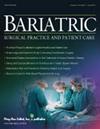Evaluation of Eating Disorders, Emotional State, and Quality of Life in Bariatric Surgery Patients: Cross-Sectional Study
IF 0.3
4区 医学
Q4 NURSING
引用次数: 0
Abstract
Background: Several factors can influence the outcomes of bariatric surgery. The aim of this study is to compare eating disorders, emotional states, and quality of life (QoL) between individuals who have undergone bariatric surgery and bariatric surgery candidates and also to evaluate the relationship between these factors. Methods: A total number of 60 individuals (the case group:30, the control group:30), participated in a cross-sectional study. The following data were collected from face-to-face interviews: the Eating Disorder Examination-Questionnaire (EDE-Q), the Emotional Eater-Questionnaire (EEQ), the Profile of Mood States-Questionnaire (POMS), and the Impact of Weight on Quality of Life-Lite Questionnaire (IWQOL-Lite). Results: Total EEQ scores, independent of surgery, showed that women were more emotional eaters than men (p = 0.002). The restraint subscale from the EDE-Q subscales showed that restrictive eating behaviors were more common in the case group (p = 0.05) According to the analysis of IWQOL-Lite subscales, the quality of life of the case group was higher in terms of physical functions (p = 0.02). In addition, eating disorders were positively correlated with emotional states and negatively correlated with quality of life. Conclusion: Eating disorders and emotional states were in a significant relationship with each other in bariatric surgery patients, and these problems negatively affected the quality of life.减肥手术患者饮食失调、情绪状态和生活质量的评估:横断面研究
背景:几个因素可以影响减肥手术的结果。本研究的目的是比较饮食失调、情绪状态和生活质量(QoL)之间的个体进行减肥手术和减肥手术候选人,并评估这些因素之间的关系。方法:共60例个体(病例组30例,对照组30例),采用横断面研究。采用面对面访谈的方式收集数据:进食障碍检查问卷(ed - q)、情绪进食问卷(EEQ)、情绪状态问卷(POMS)和体重对生活质量影响问卷(IWQOL-Lite)。结果:与手术无关的EEQ总分显示,女性比男性更情绪化进食(p = 0.002)。ed - q子量表的约束子量表显示,病例组的限制性饮食行为更常见(p = 0.05)。IWQOL-Lite子量表分析显示,病例组在身体机能方面的生活质量更高(p = 0.02)。此外,饮食失调与情绪状态呈正相关,与生活质量负相关。结论:减肥手术患者饮食失调与情绪状态存在显著相关关系,并对生活质量产生负面影响。
本文章由计算机程序翻译,如有差异,请以英文原文为准。
求助全文
约1分钟内获得全文
求助全文
来源期刊
CiteScore
0.80
自引率
0.00%
发文量
36
期刊介绍:
Bariatric Surgical Practice and Patient Care is the essential peer-reviewed journal delivering clinical best practices and quality updates for achieving optimal bariatric surgical outcomes.
Bariatric Surgical Practice and Patient Care coverage includes:
Quality outcomes measurement and reporting
Process innovations and care delivery
Short- and long-term surgical complications
Pre-surgical diagnosis and consultation
Pre-op, peri-op, and post-op standards of practice
Patient access
Patient safety issues
Nutritional and dietary support
Bariatric surgical emergencies
Best practices and current standards for bariatric surgery
Culture and ethics
Body contouring and reconstructive surgery
Bariatric teamwork and communication.

 求助内容:
求助内容: 应助结果提醒方式:
应助结果提醒方式:


